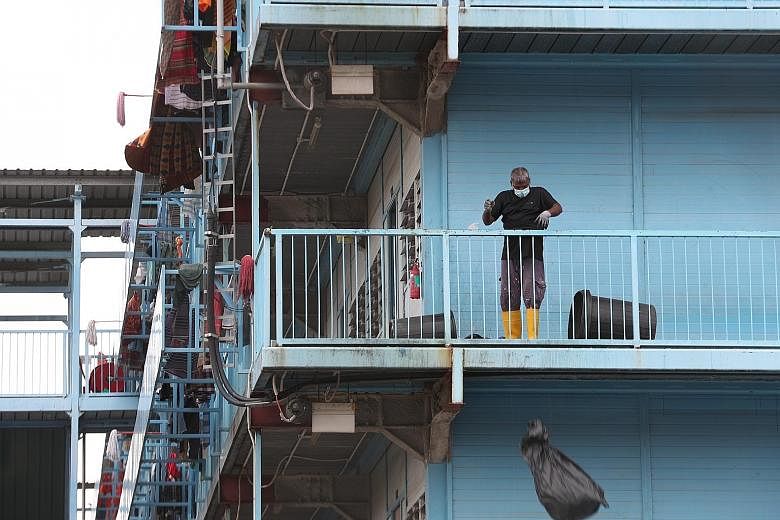The first Covid-19 cases picked up in foreign worker dormitories in a month are likely to be sporadic ones, experts have said.
These should not cause alarm unless more cases start cropping up. However, the fresh cases underscore the importance of early vaccinations for dorm residents, the experts told The Straits Times.
No new dorm cases had been reported since Dec 15 last year until a construction worker staying in Seatown Dormitory tested positive last Tuesday.
Last Saturday, the Health Ministry (MOH) reported that a thermal insulator installer from Tuas South Dormitory had also tested positive for Covid-19.
Both cases were picked up during rostered routine testing, which is required for all workers in the construction, marine and process sectors, as well as for workers from the manufacturing and service sectors residing in dorms.
The two cases are unlinked.
Close contacts, including fellow dorm residents and co-workers, have been placed on quarantine and will be tested at the start and end of their quarantine periods.
Serology tests will also be conducted to see if the workers, both work permit holders, could have been infected by their contacts, MOH said last week.
The worker residing in Tuas South Dormitory, an Indian national, was asymptomatic and had a negative serology test, indicating that his case is likely a current infection.
Meanwhile, the worker from Seatown Dormitory had arrived here from India on Dec 11 and served his stay-home notice (SHN) at a dedicated facility until Dec 25.
Tests on Dec 21 and Dec 27 came back negative so the man started work on Jan 6. After testing positive for the virus last Tuesday, he was given a serology test, which also came back positive.
Associate Professor Alex Cook, vice-dean of research at the National University of Singapore's Saw Swee Hock School of Public Health, said it is possible the worker was infected before arriving in Singapore, but this would involve a very long incubation period and bad luck with the tests.
The more probable explanation is that he was infected here shortly after exiting quarantine, possibly while at work.
Professor Teo Yik Ying, dean of the Saw Swee Hock School of Public Health, said it typically takes at least a week post-infection for serology tests to show a positive result. So the worker would most likely have been infected between last Dec 25 and Jan 5 this year.
Said Prof Teo: "Every single case that is picked up in the dormitory is of concern, given the risk of an accelerated spread... (but) rostered routine testing is already an effective procedure to ensure we are able to identify any infections early and quickly."
Prof Cook cautioned against knee-jerk reactions and said there is no need to tighten restrictions.
"Routine testing is meant to break chains of infection, not to prevent infection from ever happening... It's notable that since the rostered routine testing regime really got established, the outbreaks in the dorms that characterised the (initial virus) outbreak in Singapore have been much reduced," he said.
Regarding the Seatown Dormitory case, the Ministry of Manpower said last Friday that its Assurance, Care and Engagement Group took immediate steps to isolate the worker.
He was taken to a community care facility while residents on the same floor were taken to a government quarantine facility.
ST understands that the movement of workers on one floor was temporarily restricted until all close contacts who needed to be quarantined were identified.
Contact tracing data from the worker's BluePass token was used to identify other close contacts, including workers in other dorms.
Said the Ministry of Manpower: "The risk of Covid-19 re-emerging in dormitories cannot be taken lightly. We must continue to remain vigilant and disciplined...
"We also need to be agile in calibrating our measures."
Since Jan 6, newly arrived workers who will stay in dorms need to undergo an additional seven-day testing regime at a designated facility after the SHN.
Starting yesterday, work permit and S pass holders from the construction, marine and process sectors arriving from higher-risk countries must also be tested on arrival.
The emergence of new dorm cases has rattled migrant workers hoping for a return to normalcy.
Mr Md Sharif Uddin, 42, who moved into Tuas South Dormitory this month, said some are frustrated by the restrictions placed on them and fear that an outbreak could lead to another lockdown.
"We know doctors and nurses and residents will get vaccines first," he said.
"I think we need to start on migrant workers also, because we are at higher risk."

